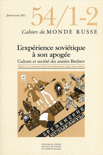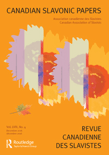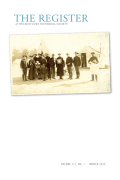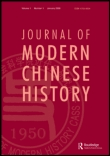
Noveishaya Istoriya Rossii-Modern History of Russia
Scope & Guideline
Engaging with the Richness of Modern Russian Histories
Introduction
Aims and Scopes
- Exploration of Soviet History and Politics:
The journal delves deeply into Soviet political structures, policies, and their impacts on society, particularly during critical periods such as the Great Patriotic War and the Stalinist era. - Humanitarian and Social Aspects of History:
It emphasizes the human condition during historical crises, exploring themes such as suffering, survival, and the societal implications of state policies, notably during the Leningrad Blockade. - Regional Studies and Ethno-National Politics:
The journal investigates regional histories within Russia and the Soviet Union, focusing on ethnic and national identities, especially in areas like Tatar villages and the experiences of Ukrainian nationalists. - Historiographical Analysis:
There is a consistent focus on historiographical trends, examining how historical narratives are constructed and re-evaluated in contemporary scholarship. - Interdisciplinary Approaches:
The incorporation of various methodologies, including sociology, economics, and cultural studies, allows for a nuanced understanding of historical events and their lasting legacies.
Trending and Emerging
- Humanitarian Crises and Social History:
Recent publications focus heavily on the humanitarian crises experienced during historical events, particularly the Leningrad Blockade, emphasizing the social history and lived experiences of individuals. - Ethnic and National Identity Studies:
There is a growing emphasis on the exploration of ethnic and national identities within the Soviet context, reflecting an interest in how these identities were shaped and transformed during and after the Soviet era. - Interdisciplinary Methodologies:
Emerging themes indicate a trend towards interdisciplinary approaches, incorporating sociology, anthropology, and cultural studies to enrich historical narratives. - Revisiting Historical Narratives:
A significant trend involves re-evaluating established historical narratives, encouraging fresh perspectives on well-documented events and figures in Russian history. - Impact of Digital Humanities:
The integration of digital tools and methodologies in historical research is gaining traction, allowing for innovative approaches to archival research and public engagement with history.
Declining or Waning
- Traditional Military History:
There seems to be a decline in the focus on conventional military history topics, as more attention shifts towards social and cultural aspects of history rather than purely military campaigns or strategies. - Early Soviet Economic Policies:
Research specifically centered around the early economic policies of the Soviet Union appears less frequently, indicating a potential shift towards more contemporary issues or cultural narratives. - Western Relations During the Cold War:
The exploration of Soviet-Western relations, particularly during the Cold War, is becoming less prevalent, possibly due to a broader focus on internal socio-political dynamics. - Biographical Studies of Lesser-Known Figures:
There is a noticeable reduction in the examination of lesser-known historical figures, suggesting a trend towards more prominent narratives that resonate with current historiographical debates.
Similar Journals

Vestnik Sankt-Peterburgskogo Universiteta-Istoriya
Connecting Scholars: A Hub for Historical AnalysisVestnik Sankt-Peterburgskogo Universiteta-Istoriya is a distinguished academic journal published by the St Petersburg University Press, specializing in the field of History. As an influential platform since its inception in 2017, the journal has rapidly gained recognition, achieving a commendable Q2 ranking in History for 2023 and ranking #631 out of 1760 in Scopus's category of Arts and Humanities. With an emphasis on fostering scholarly discourse and disseminating high-quality research, it presents a curated selection of original research articles, critical reviews, and historical analyses, appealing to historians, researchers, and students alike. Operating from Russia, Vestnik Sankt-Peterburgskogo Universiteta-Istoriya serves not only as an incubator for innovative ideas but also as a bridge for international collaboration in the historiographical community. Although it currently does not offer open access, the journal's commitment to academic rigor and relevance ensures its continued impact in the field, with converged years extending to 2024, providing a rich archive for future scholars to engage with.

Istorija
Unveiling the Past, Shaping the FutureIstorija is a distinguished academic journal published by Vytautas Magnus University Education Academy, focusing on historical research and discourse. With its ISSN 1392-0456 and E-ISSN 2029-7181, the journal aims to disseminate high-quality scholarly articles that explore various facets of history, catering to an audience of researchers, educators, and students alike. Although currently not open access, Istorija remains committed to advancing historical scholarship by contributing valuable insights and fostering academic dialogue through an inclusive editorial process. Set against the backdrop of Vilnius, Lithuania, the journal engages with both regional and international historical narratives, making it a pivotal resource for those looking to deepen their understanding of historical events, methodologies, and interpretations. Whether you are a seasoned historian or a burgeoning scholar, Istorija offers a platform for the exploration and exchange of innovative ideas and research within the discipline.

Lithuanian Historical Studies
Illuminating the Past, Shaping the FutureLithuanian Historical Studies is a respected academic journal published by BRILL, focusing on the nuanced exploration of cultural, historical, and sociopolitical dynamics within Lithuania and its historical context. With an ISSN of 1392-2343 and an E-ISSN of 2538-6565, this journal aims to disseminate scholarly research that contributes to the understanding of Lithuania's cultural heritage and historical developments. Although it operates without an open-access model, its content is essential for researchers, professionals, and students interested in History, Cultural Studies, and Religious Studies. Ranked in the fourth quartile across several categories in 2023, including Cultural Studies and Sociology and Political Science, it provides a platform for academic discourse among those researching in the field. Despite its modest Scopus rankings, it plays a critical role in advancing knowledge within these disciplines and fostering dialogue across them, making it a valuable resource for anyone engaged in the study of Lithuanian or broader Eastern European history.

CAHIERS DU MONDE RUSSE
Bridging Disciplines: History, Politics, and Culture of RussiaCAHIERS DU MONDE RUSSE, published by EDITIONS ECOLE HAUTESETUDES & SCIENCES SOCIALES in France, is an esteemed journal dedicated to the interdisciplinary study of Russian history, culture, and politics. The journal embraces a variety of scholarly insights, making significant contributions to the fields of History, Political Science, and Sociology. With its ISSN 1252-6576 and E-ISSN 1777-5388, it has established a reliable presence in academic discourse since 1999, with continuous publications until 2024. Despite its current quartile rankings placing it in Q3 and Q4 categories in pivotal fields, CAHIERS DU MONDE RUSSE plays a critical role in fostering knowledge and discussion among researchers and students alike. It serves not only as a platform for disseminating research but also as a source of rigorous analysis and historical reflection, reflecting the dynamic evolution of Russian studies within the global context.

Imago Temporis-Medium Aevum
Charting New Territories in Medieval HistoriesImago Temporis-Medium Aevum is a distinguished journal published by SPACE POWER & CULTURE- CONSOLIDATED MEDIEVAL STUDIES RESEARCH GROUP, focusing on the rich tapestry of medieval studies within the context of history. Based in the culturally vibrant region of Catalonia, Spain, this journal has established itself as a vital resource for scholars and enthusiasts alike since it adopted an Open Access model in 2007, ensuring that its compelling research is widely accessible. With an impact factor reflected in its Q3 category ranking in the field of History for 2023, and an impressive Scopus rank in the 62nd percentile amongst 1,760 publications, Imago Temporis continues to serve as an incubator for innovative scholarship. The journal's consistent publication history, particularly from 2011 to 2013, 2016 to 2018, and its ongoing commitment through 2024, underscores its dedication to advancing the understanding of the medieval era. Researchers, students, and professionals are encouraged to engage with its unique content, which is poised to challenge traditional perspectives and contribute to the global discourse in medieval studies.

Canadian Slavonic Papers
Cultivating Understanding in Linguistics and LiteratureCanadian Slavonic Papers, published by Routledge Journals, Taylor & Francis Ltd, is an esteemed peer-reviewed journal dedicated to the exploration of the Slavic, Eastern European, and Russian domains, fostering scholarly dialogue across multiple disciplines. With a robust focus on Cultural Studies, History, Linguistics, and Literature, this journal has firmly established its presence in the academic community, as evidenced by its Q1 ranking across various categories in 2023. Since its inception, Canadian Slavonic Papers has been a vital platform for researchers, professionals, and students alike, providing an invaluable repository of knowledge and insights from 1977 to the present. While not an open-access journal, it remains accessible through institutional subscriptions, ensuring a wide dissemination of scholarship. Located in the United Kingdom, the journal continues to contribute significantly to the understanding of Slavic studies within a global context, making it essential reading for anyone invested in this dynamic field.

Register of the Kentucky Historical Society
Connecting Scholars to Kentucky's Cultural Tapestry.The Register of the Kentucky Historical Society is a prestigious journal dedicated to the exploration and documentation of Kentucky's rich historical narrative and cultural heritage. Published by the Kentucky Historical Society, this journal serves as a vital resource for scholars, historians, and enthusiasts engaged in the study of regional history. Although it does not operate under an open access model, it upholds a rigorous approach to academic standards, ensuring high-quality peer-reviewed content. With its ISSN 0023-0243 for print and 2161-0355 for electronic formats, the journal provides a platform for original research articles, critical essays, and book reviews that contribute significantly to the academic discourse regarding Kentucky's history. By prioritizing comprehensive scholarship on the state's past, the Register plays an essential role in fostering a deeper understanding of local heritage, offering invaluable insights to researchers, professionals, and students alike.

Herald of an Archivist
Bridging Theory and Practice in Archival ScienceHerald of an Archivist is a distinguished journal published by the Russian Society Historians & Archivists, dedicated to advancing the field of archival studies and historical documentation. With an ISSN of 2073-0101, this journal seeks to foster scholarly dialogue among archivists, historians, and researchers interested in preservation practices, archival theory, and the critical role archives play in understanding and documenting history. Despite being categorized under a non-open access model, the journal maintains rigorous academic standards, evidenced by its ongoing contribution to the discourse surrounding archival ethics and methodologies. Though specific metrics such as HIndex and Scopus rankings are unavailable, Herald of an Archivist is anticipated to be a valuable resource for professionals seeking to deepen their understanding of archival practices in a global context, promoting innovative research and practical applications in the field.

Vestnik Permskogo Universiteta-Istoriya-Perm University Herald-History
Pioneering Insights in History and Cultural StudiesVestnik Permskogo Universiteta-Istoriya (Perm University Herald-History), published by Perm State National Research University, serves as a pivotal academic platform for scholars in the fields of History, Archaeology, and Cultural Studies. With an ISSN of 2219-3111 and an impressive trajectory of convergence from 2019 to 2024, this journal has secured a commendable Q1 ranking in History and is recognized in the Q2 quartile across multiple relevant categories, demonstrating its significance in the scholarly landscape. Despite the absence of an open access model, the journal remains highly impactful and continues to contribute richly to the discourse surrounding historical and cultural research within the Russian Federation and beyond. The journal publishes original research, reviews, and theoretical papers, making it essential reading for those engaged in historical studies and related fields.

Journal of Modern Chinese History
Advancing Scholarship on China's Modern JourneyThe Journal of Modern Chinese History, published by ROUTLEDGE JOURNALS, TAYLOR & FRANCIS LTD, stands as a premier forum for scholarly dialogue focused on the historical experiences and developments within modern China. With its ISSN 1753-5654 and E-ISSN 1753-5662, this journal, which has been disseminating knowledge since 2007, is ranked in the Q2 quartile for history, reflecting its significant impact and scholarly contribution within the field. Operating out of the United Kingdom, it serves as a critical resource for academics and researchers seeking to explore the complexities of Chinese history, with a strong emphasis on modern interpretations and methodologies. The journal is highly regarded in the Arts and Humanities discipline, holding a Scopus rank of #922 out of 1760, placing it in the 47th percentile. By providing access to cutting-edge research and discussions, the Journal of Modern Chinese History is an indispensable asset for scholars, students, and professionals alike who strive to deepen their understanding of this pivotal region's past and its implications for the present.